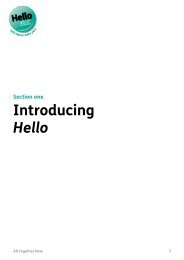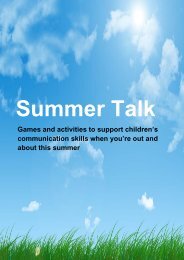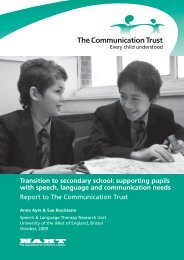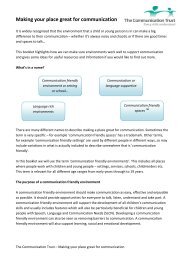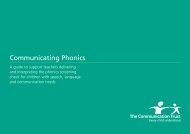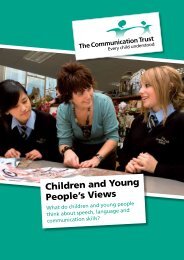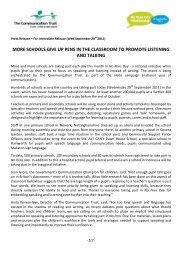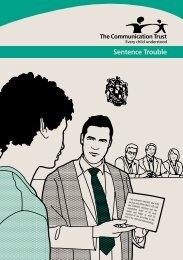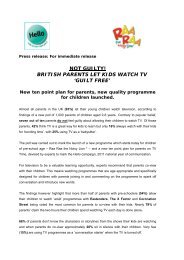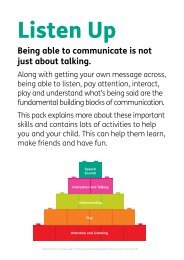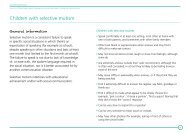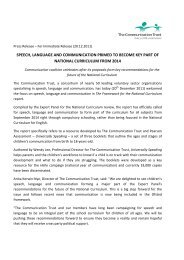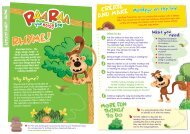Don't Get Me Wrong - The Communication Trust
Don't Get Me Wrong - The Communication Trust
Don't Get Me Wrong - The Communication Trust
You also want an ePaper? Increase the reach of your titles
YUMPU automatically turns print PDFs into web optimized ePapers that Google loves.
Has difficulties using sentences with conjunctions including ‘and’,<br />
‘because’ ‘so’, or uses these words too much<br />
May take a long time to organise words into a sentence Pauses for a<br />
long time before responding or stops mid sentence, searching for a word<br />
Misses out words or puts them in the wrong order “Last night football<br />
played park” for ‘last night I played football in the park’<br />
Has difficulties giving specific answers or explanations “I dunno, its kind<br />
of, something that’s, well you know…”<br />
Has difficulties recalling and sequencing events and ideas appropriately<br />
Finds it difficult remember or tell a story, even a simple one<br />
CONTENT: <strong>Me</strong>aning of their message – semantics <strong>The</strong> pupil:<br />
Has limited vocabulary Uses same core vocabulary which could lead to<br />
excessive swearing<br />
Finds it hard to express emotions verbally Can’t explain how they are<br />
feeling or why<br />
Uses fluent clear speech which doesn’t seem to mean much Came over to<br />
that place and did that you know<br />
Has trouble learning new words Names of people and objects<br />
Cannot provide significant information to listeners Difficult for the listener<br />
to understand what their message is<br />
Uses made up words which are almost appropriate ‘Window worker man’<br />
Overuses ‘meaningless’ words Thingy, whatever, and that<br />
USE: Purpose, function or reason for communication including pragmatics and social<br />
communication. <strong>The</strong> pupil:<br />
Has difficulties with eye contact or personal space Doesn’t make eye<br />
contact or gets too close to others<br />
Interrupts inappropriately Not aware of when it is and isn’t appropriate<br />
to say something<br />
Avoids situations which require words Social situations, reading out loud<br />
or presenting to others<br />
Is unable to vary language with the situation Uses the same language<br />
with peers, teachers and unfamiliar adults<br />
Attracts attention in inappropriate ways or without words Annoys others,<br />
fiddles with things, or sits quietly and does their own thing<br />
In conversation, moves from topic to topic for no obvious reason or finds<br />
it difficult to change the subject “Do I need to type this up, so can I go<br />
and talk to Sam, I like your earrings”<br />
Has difficulties taking turns in conversation Always monopolises the<br />
conversation or doesn’t understand when someone has a different view<br />
and changes the focus



